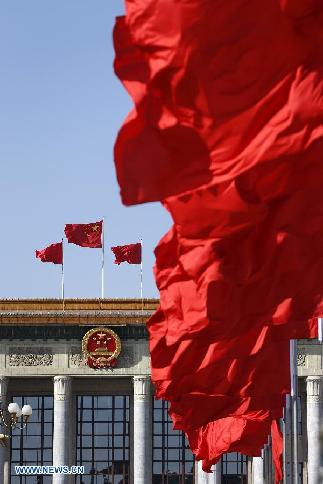The NPC, the CPPCC and the Chinese Dream
- By Sajjad Malik
 0 Comment(s)
0 Comment(s) Print
Print E-mail China.org.cn, March 3, 2014
E-mail China.org.cn, March 3, 2014
There is no better time in China to seriously ponder the idea of the Chinese Dream than the sessions of the National People's Congress and the Chinese People's Political Consultative Conference, opening this week.
|
|
|
Photo taken on March 1, 2014 shows flags flapping against a clear sky outside the Great Hall of the People in Beijing, capital of China. [Xinhua/Shen Bohan] |
At the conclusion of the 18th National Congress of the Communist Party of China, General Secretary Xi Jinping introduced the idea of the Chinese Dream for the first time and further elaborated on it while speaking at an exhibition at the National Museum of China. The holistic concept of inclusive progress and ascendency to the glory of prosperity and growth has been skillfully woven into this notion. Its varying connotations and the timing of its announcement have already sparked lively local and international debates. For some international analysts, it could be a veiled attempt to make Communist China a global political power house. Some interpret it as struggle to overcome internal dissent and a tool to curb any effort for greater political and social reforms. Others think it is a variant of the American dream of democracy and liberty.
But for the Chinese leadership, led by President Xi, it means more than is understood by the outside world.
Xi said that the Chinese Dream is the dream of the people, for them to enjoy better education, more stable employment, higher incomes, a greater degree of social security, better medical and health care, improved housing conditions and a better environment for their children, satisfactory jobs and better lives.
The president has tried to develop the dream into a comprehensive national theme of development aimed at rejuvenating the nation by weaving together individual and collective progress. It transcends the old idea of sacrificing individual happiness at the altar of national progress. The dream means building a strong nation by strengthening old social bonds and transform Chinese development into a universal experience.






